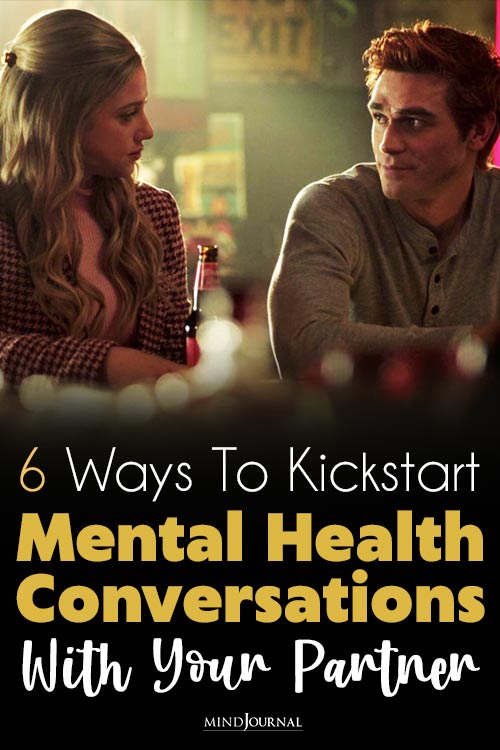Have you ever noticed that having mental health conversations in a relationship gives you a sense of relief and makes you feel better, perhaps confident about your feelings?
Having a mental health dialogue is crucial for having a healthy connection, but starting that conversation can be tough. People tend to have a hard time expressing their feelings, while others are afraid of being judged or misunderstood.
In this article, I’ll present six unique ways you can start a conversation with your significant other about mental health. So you both gain that support and understanding from each other.

Read more here: 7 Conversation Hacks That’ll Help You Hit It Off With Anyone
How To Start Mental Health Conversations In A Relationship?
1. Choose The Perfect Atmosphere
First and foremost, you need to pick the right setting for your mental health dialogue.
Choose a place where both of you can feel safe and comfortable. It would also be best to set up a time when neither of you is stressed or busy.
The environment you’re in plays a huge role in ensuring that everyone remains relaxed during serious conversations, so make sure the atmosphere and vibe allow you to stay calm.
This could be over dinner, during a walk, or on a weekend away—maybe even at a cute cafe around the block that you both have been waiting to try out.
And, don’t forget to give yourselves enough time to discuss everything you need to. You don’t want anyone to feel rushed in the process.
2. Using “I” Statements Can Make Conversations In A Relationship Meaningful
When you open up about your feelings using an “I” statement, it creates a more inviting space for the conversations to have with your partner. Instead of pointing fingers, try expressing yourself with a personal touch.
Say “I’ve been feeling really stressed out lately and I wanted to talk to you about it.” instead of saying “You never listen to me when I’m stressed.” Your partner will respond in a more empathetic way because they won’t feel attacked or defensive.
3. Share Your Personal Experiences
Creating vulnerability by opening up about your own mental health experiences encourages your partner to open up too. Having personal conversations about struggles and triumphs helps remove the stigma around mental health.
Share specific situations like how they made you feel at the moment along with coping mechanisms you used. This allows your partner to feel comfortable sharing their experiences as well.
4. Utilize Analogies To Explain Yours
If you’re wondering how to start a mental health conversation, using analogies can help break down complex emotions better than words can do alone. You might compare mental health to being on a roller coaster ride for example.
It has its ups and downs just like any other ride in an amusement park would. Explaining that right now though, it feels like you’re going through one of the toughest parts of the ride gives them an idea of your emotional state without you explaining every little detail.
Analogies like these can help your partner understand the concept of mental health struggles and then have a more compassionate conversation about it.
5. Ask More Than Just Yes Or No Questions
If you ask “Are you okay?” and they respond “no”, then that’s the end of that conversation. However, if you really want to get someone to open up, then ask them questions that make them think.
Instead of asking simple questions like “Are you okay?”, go for deeper ones like “What’s been on your mind lately?” or something more personal like “How has your mental health been since our last talk about it?”.
This will allow them to dig deep into their thoughts and emotions which will ultimately lead to a better convo. While they speak, be sure to stay silent without judgment or interruption.
6. Find An Activity To Do Together
Instead of sitting down with them in the same room, find an activity to do together. Suggest things such as meditation sessions, a nice walk outside or even going to the gym.
Doing this can make people feel more comfortable talking about their mental health as they won’t feel like they have a spotlight on them since both people are focused on something else.
It also allows for more topics and ideas to come up when talking about how one feels.
Read more here: Unlocking the Secrets to Love: 6 First Date Questions and Conversation Starters
Ultimately, these six mental health conversations to have with your partner can help you be more kind, and open-minded and even strengthen your relationship.










Leave a Reply